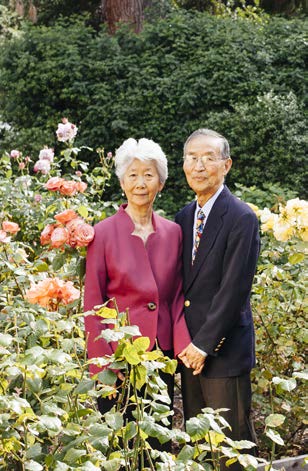 Chue-San Yoo entered WPI in 1983 with little money and lots of anxiety. But a reassuring word from the then department head and chemical engineering professor Yi Hua (Ed) Ma helped forge the course of his academic—and, ultimately, professional—career.
Chue-San Yoo entered WPI in 1983 with little money and lots of anxiety. But a reassuring word from the then department head and chemical engineering professor Yi Hua (Ed) Ma helped forge the course of his academic—and, ultimately, professional—career.
Now Yoo ’85 (MS), ’88 (PhD), himself the recipient of a chemical engineering fellowship, is repaying his professor’s kindness through a $250,000 fellowship donation in Ma’s honor.
Last October, when President Leshin and a WPI delegation, including Ed and his wife Maria, traveled to Taiwan, several of Ma’s former students—aware that the professor was planning to retire after nearly 50 years—“expressed an interest in doing something at WPI that would honor his legacy,” says Karen Bean, executive director of advancement, global strategies and special projects. It was decided that PhD support was most appropriate due to Ma’s life-long commitment to research and doctoral education.
Discussions are underway with other alumni donors, and Ed and Maria donated land to be sold for the fellowship’s benefit. The land was not mortgaged so the Mas will receive a tax deduction for the appraised value of the land. Once the land was transferred, WPI began the process of putting the land up for sale. Once the land is sold, the proceeds will be added to the Yi Hua (Ed) and Maria Ma Graduate PhD Fellowship in Chemical Engineering.
Bean says total contributions to Ma fellowship are expected to reach $1 million.Susan Roberts ’92, department head of chemical engineering, says, “I think so many alumni are enthusiastic about this fellowship because they understand the impact both Ed Ma and the broader doctoral community in chemical engineering have had on their successes. This fellowship aligns directly with the WPI Strategic Plan and has the potential to significantly elevate the PhD program in chemical engineering and the broader WPI community.”
Ma, who has won numerous awards and made a name for himself developing metallic membranes designed to separate out hydrogen from coal-burning power plants while obtaining carbon dioxide with sufficient purity for sequestration, says, “I had chances to go to other places, but chose to stay because I enjoyed the WPI environment, especially teaching and research. WPI provided a great place to do both.”
In an email to Bean, Ma said, “It is truly gratifying to hear from a student that I’ve made a difference [in] what he was able to accomplish.”

